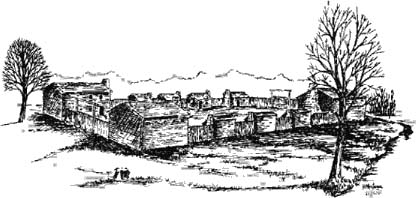|
 Logan's
Fort set on a slight elevation about fifty yards west of
the smaller spring at St. Asaph. The fort was 90 X 150
feet and was constructed of logs. Gates were located at
each end and were raised and lowered by leather thongs.
The main gate faced east. Logan's
Fort set on a slight elevation about fifty yards west of
the smaller spring at St. Asaph. The fort was 90 X 150
feet and was constructed of logs. Gates were located at
each end and were raised and lowered by leather thongs.
The main gate faced east.
Along the south
side, two blockhouses were
built, one on each end, with
three cabins between, which were occupied by Wm. Menniffee,
Wm. Whitley and the James Mason families. On the north side,
only one blockhouse was built. It was on the northwest
corner. There were four cabins adjoining occupied by George
Clark, Benjamin Logan, Benjamin Pettit and Samuel Coburn.
A conventional
cabin occupied the northeast corner. This was the only
corner of the fort without a blockhouse. The cabin that
Logan built in 1775 was a part of the fort. The fort's water
came from a spring that lay 50 yards to the east. A tunnel
was dug from inside the southeastern blockhouse to the
springhouse, which covered the spring. The tunnel was four
feet deep and three feet wide. A person could obtain water,
undetected, in time of siege by the Indians.
The land about the
fort had been cleared of all trees and cane so the Indians
would not have shooting cover to approach the fort. The
ridge to the south of St. Asaph's Branch was not cleared and
most of the firing of Indian guns came from here. The
distance, 200 to 250 yards, was too great, and the shot and
arrows had little effect.
At the foot of the
hill, on St. Asaph's Branch, just below the fort, the
settlers maintained a gristmill. In all probability, this
was the first mill built in Kentucky. During his first visit
to the fort in late April of 1778, Daniel Trabue spoke of
eating bread - something that could not be obtained at Fort
Boonesborough.
Capt. Briggs drew a sketch of Logan's
Fort for Lyman Draper. He stated that Buffalo Spring lay
about 200 yards south of the fort and a small branch
descended from it with an abrupt high woody bluff above. He
also confirmed the subterranean passage that led to the fort
spring and that another row of cabins was built and the fort
enlarged in 1778.
|
